#analysis: poem
Text
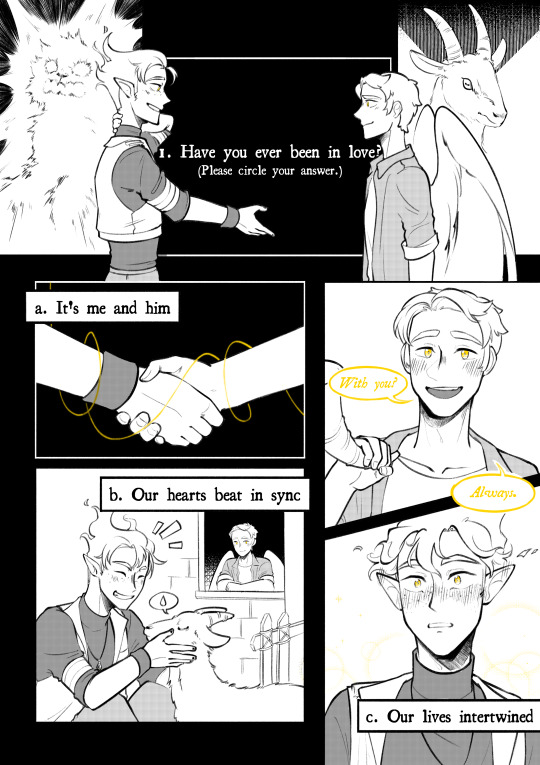
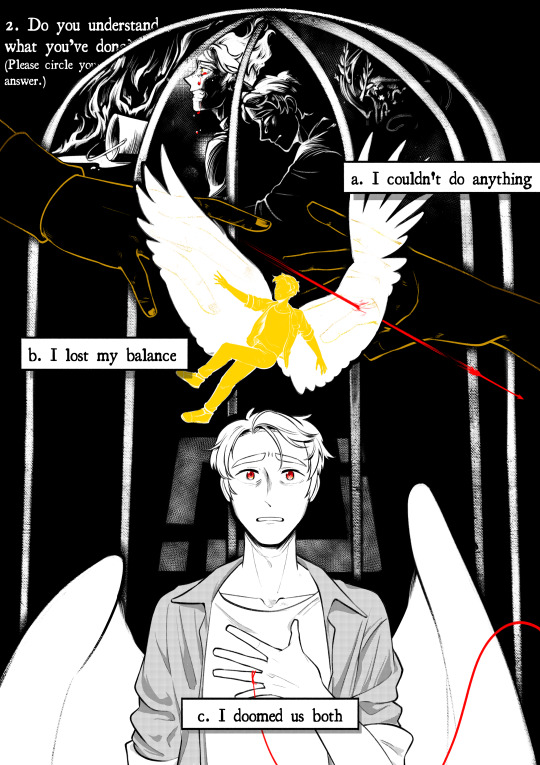

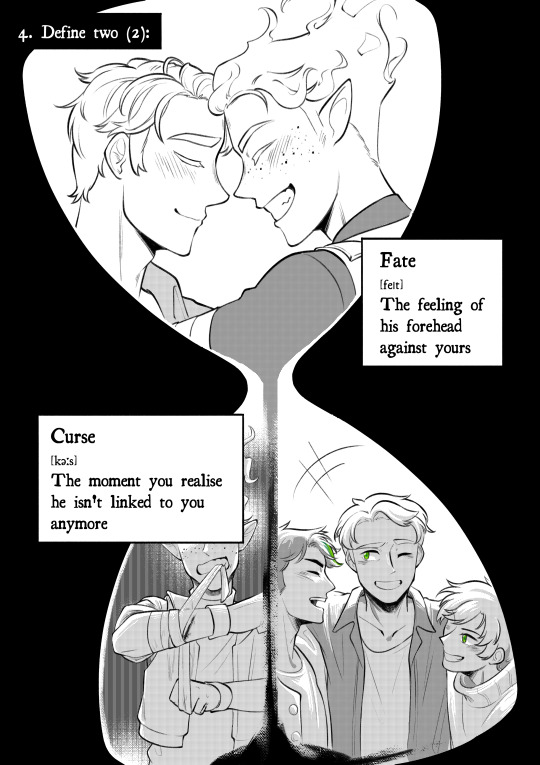
You have 90 minutes to complete. (original poem: r.a.)
In participation of the MCYT Recursive Exchange 2024 hosted by @mcytrecursive!
Inspired by know that all my love will be your breath (i will save you when your lights go out)
[text under cut]
1. Have you ever been in love?
(Please circle your answer.)
a. It's me and him
b. Our hearts beat in sync
c. Our lives intertwined
2. Do you understand what you’ve done?
(Please circle your answer.)
a. I couldn't do anything
b. I lost my balance
c. I doomed us both
3. It's been god knows how long since you felt phantom hands on your neck and there is no one in sight. If you were soul-bound to him and both of you died at the same time then why are you still waiting in the void?
Please answer clearly, in full sentences.
(Not a correct answer:I just wanted to see him one more time).
4. Define two (2):
Fate | The feeling of his forehead against yours
Curse | The moment you realise he isn't linked to you anymore
5. True or False:
i. It was your fault.
ii. You wish you had met him under different circumstances.
iii. You can’t regret a single moment that you had him.
iv. You would do it all over again if you could.
v. It ended long before either of you said anything.
thumbnails:

sketch cover thing for imgur link:

#team ranchers#team rancher#rancher duo#jimmy solidarity#tangotek#trafficshipping#mcyt recursive exchange#events#fic fanart#my art#“canary has butterfly-shaped wings it cant do a dramatic spread like that” watch me. (draws dramatic wings) (sorry)#“you have 90 minutes” have been rattling in my brain for so long ever since i suddenly remembering a web weave using it (yes the beeduo one#very glad i can release it (using it in art) from its confines (my mind)#hm i suppose the title would be more in theme if its abt limited life ranchers#← havnt watched limlife yet#but! happy with what i come up with. lil bit proud even#had so much trouble with the panelling and layers in p2 cause it looks too busy (explodes)#also punching the floor bc i only noticed the “yes-no” pair(?) in the original poem when im already half-done w/ the comic#me when making silly comic makes you do poem analysis#i dont even go there ← does not have enough poetic braincells
2K notes
·
View notes
Text
“I wanted my Mommy back, even if she didn’t love me.”
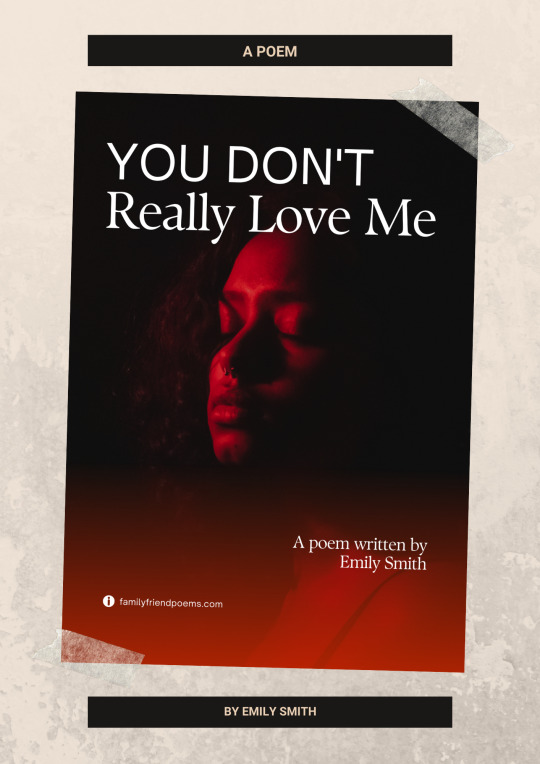
‘You Don’t Really Love Me’, a poem written by Emily Smith.
Read original post here.
Listen to my recital here.
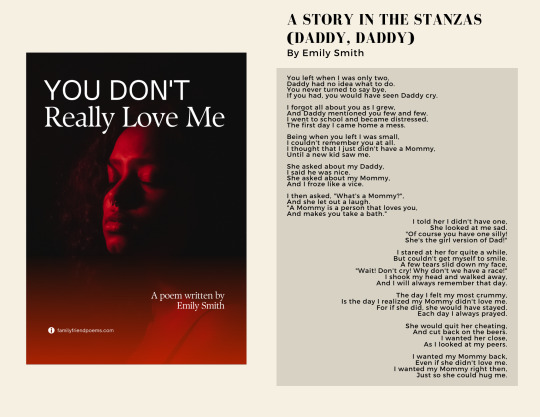
“You Don’t Really Love Me” is a rhetorical, aabb rhymed poem about a young girl and her struggle growing up without her mother. Her mother left her when she was very little and she had no single idea about her mother’s existence, forgetting her bits by bits. Soon enough, she came to a realization that she used to have a mother, only that she left. She then acknowledged the fact that her mother left because she never loved her because if she did then she would have never left. The writer used several literary devices to set the mood and build the readers’ sentiments regarding the story of this poem.
The first three stanzas of the poem is a flashback from when her mother left her and the whole family until she met a new kid who asked her about her mom. The flashback helps the reader to understand her background, knowing she was being left behind when she was only two years old and grew up forgetting little pieces of her mother that remained. The line “And Daddy mentioned you few and few” makes it even more reasonable that she just thought that she did not have a mother, because her father only mentioned her a few times.
In the fourth stanza, a simile is used as a literary device. The line “She asked about my Mommy / And I froze like a vice” tells that she could not do anything when she was being asked about her mother. The simile is used to describe that she was freezing to the question like someone who is getting caught when doing crimes. It shows that she was utterly confused because she grew up not knowing what a Mommy is, considering that she left the family back then. In the fifth stanza, the writer asked a rhetorical question to the new kid. “I then asked, “What’s a Mommy?”” It may seem rhetorical to the new kid and to the readers, but the writer genuinely did not know a Mommy hence she asked the question. In the sixth stanza, when the writer told the new kid she did not have a Mommy, the new kid replied with an irony. ““Of course you have one silly!”” is her reply. It is considered as an irony because the new kid thought she—like everyone else—had a mother, but she actually did not have one.
The mood changes drastically in the last three stanzas from utter confusion to sadness because then the writer started noticing the absence of a mother in her life. “The day I felt most crummy, / Is the day I realized my Mommy didn’t love me” emphasizes how she felt knowing she was unloved by her own mother. The mood gets even sadder with the last stanza, “I wanted my Mommy back, / Even if she didn’t love me.”, because it shows her desperation to have her mother back.
Each literary device used in this poem creates a more intense emotion as the poem goes from one stanza to the other. The writer tries to emphasize the sadness and desperation she felt through the use of literary devices and it works. It is normal for a child to experience despair when they are being left behind by a parent, especially realizing they have always been unloved despite being a child that was born from the same person. The writer did a good job portraying that emotion through her writing and the literary devices she used.
0 notes
Text



The Analysis of Yearning (Garod), Paruyr Sevak (from “Anthology of Armenian poetry")
#paruyr sevak#the analysis of yearning#karot#quotes#literature#poems#poetry#yearning#longing#armenian poetry#armenian literature#translated literature#classic literature
1K notes
·
View notes
Text




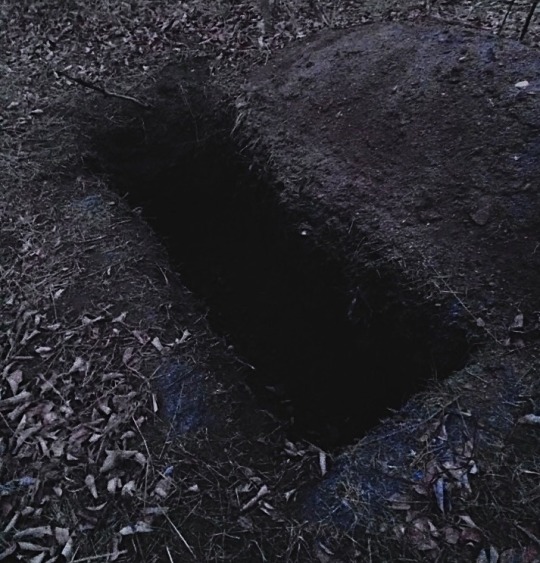
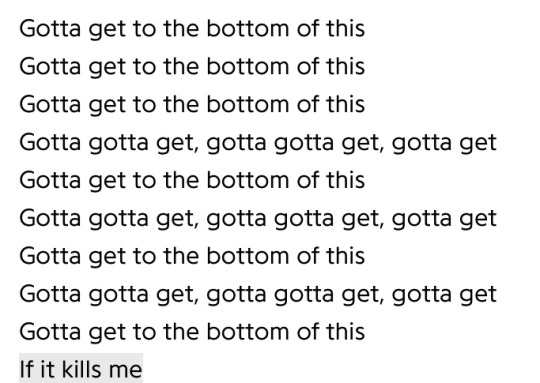


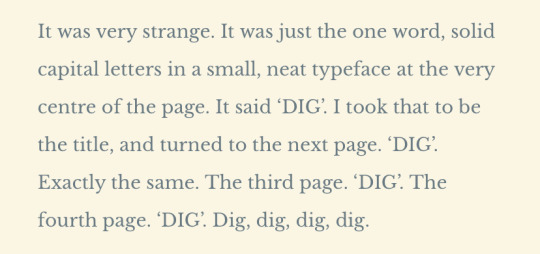

Digging too deep:
Philosophical obsession to the point of self destruction
[Image description: A collage consisting of 10 different photographs and quotes, all related to digging and holes. From top to bottom:
A wikipedia headline that says “Law of Holes”.
A close up of a shovel, digging into loose dirt.
An excerpt from a wikipedia article about the law of holes: The law of holes or the first law of holes, is an adage which states: "if you find yourself in a hole, stop digging." It is used as a metaphor, warning that when in an untenable position, it is best to stop making the situation worse.”
A lyrics excerpt from ‘The Song With Five Names’ by Will Wood: You can break a shovel when you break new ground / You dig dirt up when you dig deep down / You should know better than that by now / It's not profound to know that you could never know!
A blurry photograph of a dark rectangular hole in the ground, seemingly a grave. The hole is so dark the bottom of it isn’t visible. Besides the hole there is a pile of dirt.
A lyrics excerpt from ‘Hand Me My Shovel, I’m Going In!’ by Will Wood and The Tapeworms: Gotta get to the bottom of this/ Gotta get to the bottom of this / Gotta get to the bottom of this / Gotta gotta get, gotta gotta get, gotta get / Gotta get to the bottom of this / Gotta gotta get, gotta gotta get, gotta get / Gotta get to the bottom of this / Gotta gotta get, gotta gotta get, gotta get / Gotta get to the bottom of this / If it kills me
An excerpt from a wikipedia article about the law of holes: The second law of holes is commonly known as: "when you stop digging, you are still in a hole."
A photograph of a deep round hole. There’s a ladder going down into it and the bottom of the hole isn’t visible.
An excerpt from the transcript of episode 88 of The Magnus Archives: It was very strange. It was just the one word, solid capital letters in a small, neat typeface at the very centre of the page. It said ‘DIG’. I took that to be the title, and turned to the next page. ‘DIG’. Exactly the same. The third page. ‘DIG’. The fourth page. ‘DIG’. Dig, dig, dig, dig.
A lyrics excerpt from ‘Hand Me My Shovel, I’m Going In!’ by Will Wood and The Tapeworms: Looking down I could say heaven sent me / Hand me my shovel, I’m going in!
/end ID]
[‘Law of Holes’ - Wikipedia, ‘The Song with Five Names, a.k.a. Soapbox Tao, a.k.a. Checkmate Atheists! a.k.a. Neospace Government, a.k.a. You Can Never Know’ - Will Wood and the Tapeworms, ‘Hand Me My Shovel, I’m Going In!’ - Will Wood and the Tapeworms, MAG 88 ‘Dig’ - The Magnus Archives]
#web weaving#web weave#the buried#the magnus archives#will wood#paralells#spilled thoughts#horror#anyways- I’ve been kinda deeply obsessed about how academic and philosophical obsessions can lead to self destruction#in the form of overthinking and over analysis#never done web weaving before but I really enjoyed this!!#(this is deeply inspired by ‘Self Ish’ by will wood if you couldn’t tell)#I also had a really nice hamlet quote I wanted in this but alas the picture limit#(That and an amazing devil lyrics)#but also don’t take this too seriously#it’s more of a musing than anything actually ‘artistic’#more of a macaroni and paint collage than a poem yk?#all the photos are just stockphotos I’ve edited slightly btw#Maria’s stuff#mariacore#cw claustrophobia#tw claustrophobia#tw death#tw self destructive behavior#tw self sabotage#let me know if I should tag anything else!#image described#(God I hope it was the right choice to add all the hand me my shovel lyrics)
588 notes
·
View notes
Text

Quite literally the opposite of Donna Tartt's "Death is the mother of beauty[...]Beauty is terror. Whatever we call beautiful, we quiver before it."
#the secret history#tsh#tsh donna tartt#donna tartt#richard papen#francis abernathy#camilla macaulay#charles macaulay#bunny corcoran#henry winter#poetry#poems and poetry#poem#poems#dark academia#dark acadamia quotes#dark acadamia aesthetic#chaotic academia#chaotic academic aesthetic#aesthetic#kait rokowski#literature#classical literature#classics#classic literature#literary quotes#literary analysis
168 notes
·
View notes
Text
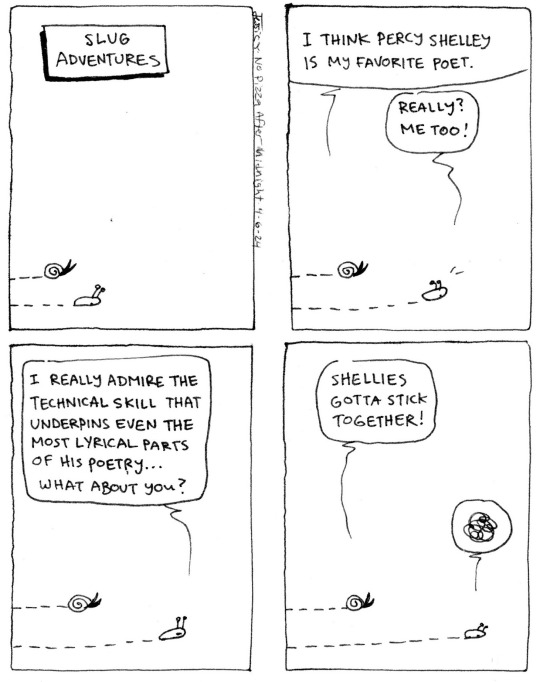
#ozymandias#slug adventures#poet#percy bysshe shelley#shellies...#I had to make up the Slug's analysis. Ozymandias is my favorite poem (I had to memorize it for school) but I'm not much of a poetry-reader#so I don't know how Shelley's other work actually is#snail
87 notes
·
View notes
Text
A list of the Entities in TAD songs and their aesthetics:
(Except not the ones Madeleine or Joey say they are because there are way too many of those)
The King - crumbling walls, secrets lurking in cobwebbed corners, crashing waves in a storm. Being protected, forgotten, isolated, smothered.
The Creature - scratching, clawing, screaming. Torn curtains and bloodied nails, you have to get out, you have to get out, YOU HAVE TO GET OUT, YOU HAVE TO GE-
The Old Man - broken promises, hair so tangled it brings tears to your eyes when you brush it. A too-tight corset. Being sent to bed without supper. Wondering what you did wrong, why won't they love you?
The Fox - screaming at your own reflection in a cracked mirror, branches whipping at your face as you run through the forest. It doesn't matter how fast you run, the truth will always find you, always be waiting for you.
The Trees - tall branches and taller tales. Climbing through branches that could crack under your weight, but knowing they won't, that their support will lift you higher, ever higher. Watching the earth fall away beneath you. Wondering if you'll ever feel the ground beneath your feet again, and if you even want to.
The Hollow Folk - watching, whispering, waiting. Shadows flicking through the corners of your vision, devils and guardian angels and everything in between. They hold no secrets in their hearts because there is nothing there to hide, nothing even to see. Empty shells of former people, observing and oh-so-patient. They will get what they want, in the end.
The Saint - staring your mistakes in the face and knowing you'll never change. Burning your past and dancing in the ashes as you suffocate in the smoke that coils itself around you. You can never escape the flaws that reside deep in the furthest recesses of your soul. You will never get it right because you dont even know what right looks like anymore.
Good Man Grace - tough love that won't take no for an answer. Empty promises to be there for you that crumble to dust as soon as you ask for help. You could be better than you are if only someone would tell you how, but nobody will. You'll never be on your own, but you're always alone.
Old Witch Sleep - comforting, cajoling, calamitous decisions masked behind gentle persuasions. Burying your head in the sand, only to choke on the grains that fill your eyes and cling to your tongue. You can rest now. You don't need to worry about anything. You never will again.
#the amazing devil#joey batey#madeleine hyland#song lyrics#tad#amazing devil#music#song analysis#the horror and the wild#love run#ruin#aesthetic#monster#poem#poetry
363 notes
·
View notes
Text
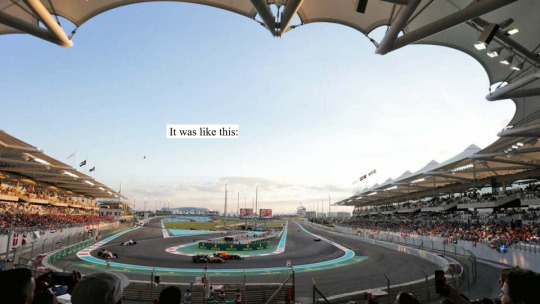

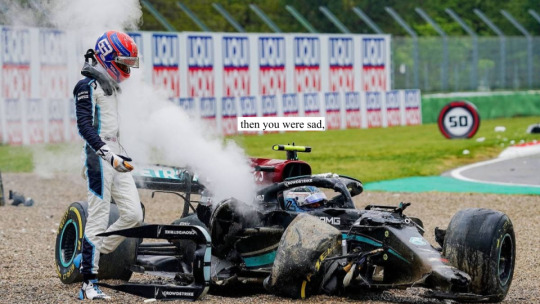


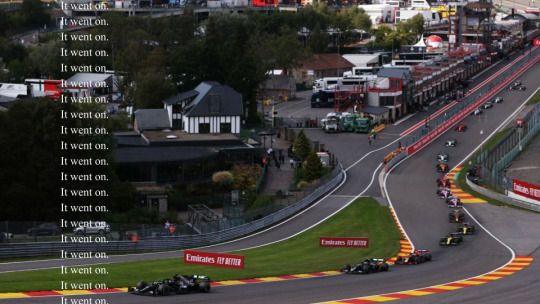
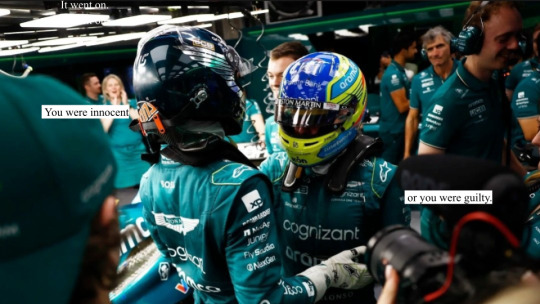



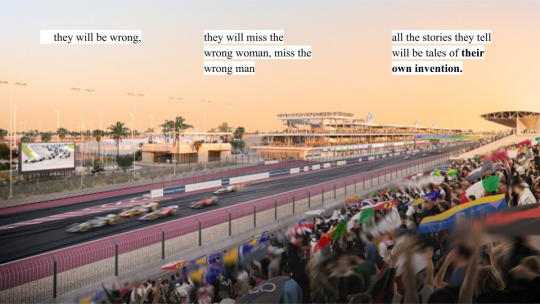
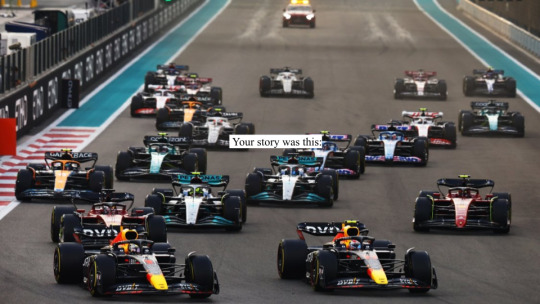


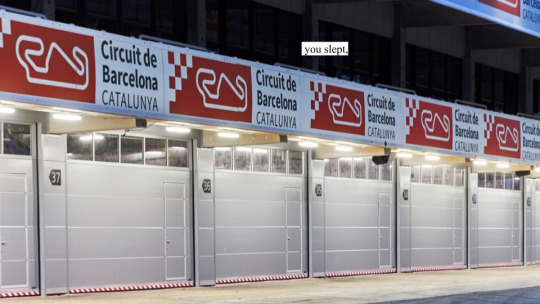
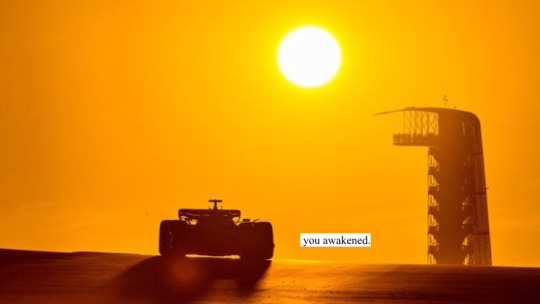
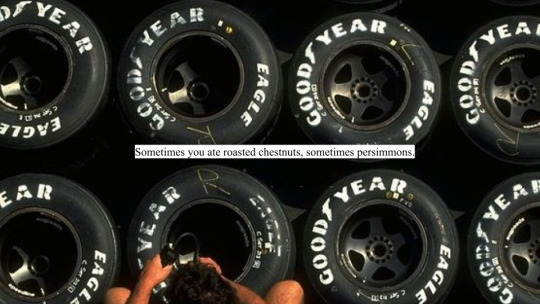
It Was Like This: You Were Happy by Jane Hirshfield
Merry Christmas clara @frickinsweet from your secret santa <333
I hope you have a wonderful 2024
ps I've absolutely butchered this gorgeous poem (cutting out an entire stanza and a half) so obligatory link to the poem!
#f1#f1edit#kirian.edit#i wrote a really long note and analysis on media in f1 + the narratives in sports but then decided that will be for another day#i really hope you like this bestie know you only stated 3 drivers as your favs but this poem just did not work with them so vouwbrvu#once again merry christmas and hope you have a great day ahead of you <33
165 notes
·
View notes
Text
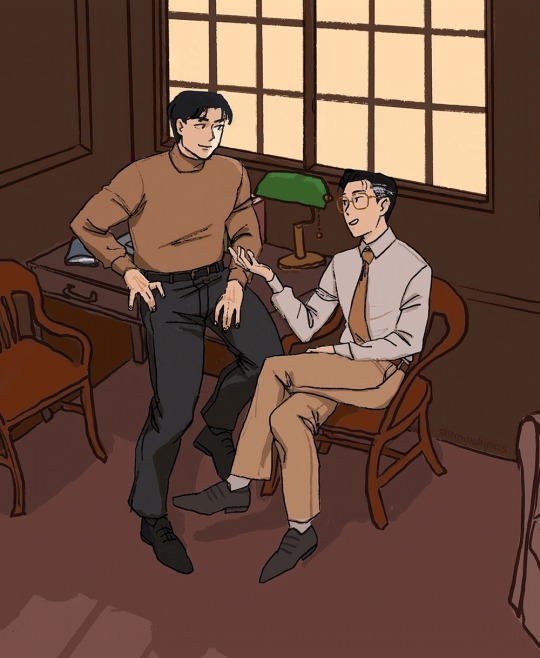
this luo binghe only listens to tortured classical music
#they're doing yaoi comparative analysis#or quoting ci poems#or talking abt the super gay characters in the text the undergrads have to read in a failed attempt on binghe's part to say omg just like u#hes like idk schubert piano trio no 2 in e flat major#or like chopin nocturne no 21 in c minor#dArK aCaDeMiA oOoOo#cursed au continues#why is he sitting on the desk like that#bingqiu#shen qingqiu#sqq#luo binghe#lbh#svsss#scum villain#sv academia au
377 notes
·
View notes
Text
Anyway time to talk about the 6x03 poem:

As many others have speculated judging by the map, Captain Skall made her way to Hook named after her, and then "as east she sailed
into waters so deadly and cold" in the Frozen Shards, her ship eventually being stuck and meeting her doom there.
With that out of the way, I want to talk about other pieces of info, why this might be the poem for 6x03 specifically, and where I think Skall may fit timeline wise:
"From the isles without name" makes me think of the Independent Isles in between Evenere and Katolis.
"sailing north, she called herself free" makes me feel feral with Callum (and Rayla) doing the same in hopes of freeing Callum from Aaravos' grasp by destroying the prison
"Through forests and flowers, past the uneven towers" clearly symbolizes Katolis, indicating that Skall lived once most of the human kingdoms had been established, and thereby post-Exile/Exodus.
"Skall hungered for glory, she wanted a story / they’d tell it long after she died". Routinely we see a desire for glory / worthiness / power described as hunger ("Hungry for knowledge and power" / "But that small taste left some humans hungry—starved, even—for a better path. An easier path. And thus Elarion became the birthplace of a new form of magic, a shortcut to primal power: dark magic"). This also comes into seeking a legacy.
"So with winter wind’s blowing / she sailed north, forgoing / a man who’d have made her his bride". This is where we see the poem take a more negative slant in a few ways. The first is winter, wind, and north, setting up a future unfortunate turn of events. This is also the first mention of Skall having something else in her life other than adventure and something she had to subsequently abandon. While the end of the poem is much more on her side of feelings, "forgoing" does mean "renouncing; sacrificing or giving up" something that is more positive.
"Alone in the cold, yet ever so bold" again adds to the more negative feeling the poem is building, as boldness is in the contrast with "alone in the cold" that's overall negative and maintaining a bit more of an upkeep. Likewise, we see the return of the wind with an even more negative connotation in wailing in the following stanza: "And oh, winter wailed / as east she sailed / into waters so deadly and cold". We see the return of cold but also the change into things being 'deadly' (although there were still hints of danger earlier, as 'bold' indicates).
"Then came the ice, and trapped in its vise" The cold finally catches up to her, and we see ice return as a form of entrapment (2x06, 3x08, 3x09, 5x04, 5x06, 5x08). Most interestingly, "vise" is a tool with closable jaws for clamping things. Maybe the ice is magical, or the jaw of a great (the dragon we've seen in the trailer) creature?
"And while she found peace / she wished that, at least / she’d told him she loved him, always". While the poem ends on a somewhat bittersweet end (at death but at peace), we do see that Skall died with a final regret to the man she could've wed but left instead.
Or you could say, a last wish.

Either way, the poem paints a rather grim journey: going North didn't hold the same freedom and achievements that Skall hoped for, and instead led to entrapment, separation, and death.
That said: there's a few Rayllum-y things I think we can glean from this poem, for starters:
1) The episode will likely have a strong focus on Callum and Rayla sailing to and/or through the Frozen Sea on whatever ship they're planning to use to get there. This leaves 6x02 "Love, War, and Mushrooms" more open to either explore other plot lines or another pit stop in their journey (like say, the Silvergrove)
2) The poem itself has pretty clear Rayllum parallels, specifically in TDP's continual gender subversion of the women who puts other things above her romantic relationship, even if it's likewise seen as a sacrifice. Rayla left Callum in order to protect him/the world from Viren, even if that meant damaging their relationship, and Skall puts her desire for glory and adventure over presumably a more settled married life at home. (Excuse me while I scream over "forgoing a man who'd have made her his bride.")
3) The poem likewise has some parallels to Rayla's "Dear Callum" letter specifically. There are wishes expressed of the leaving party, a desire to have made feelings more plain that Callum reiterates in 5x04 when they think they're about to die ("I hope you know—" "I know"), and most notably, a parallel to the always mention:
she wished that, at least
she’d told him she loved him, always.
But, if it does—if you feel that soft aching—know that that piece of your heart isn’t missing. It’s not missing at all, Callum: I’m carrying it with me! Always. I love you. I love you so much.
4) All this bodes quite well for 6x03 being an episode with a big Rayllum moment in it — perhaps even their Big "You Finally Came Back" Talk — especially since there's not much else to (presumably) happen on a ship if they're just travelling somewhere (and not being pursued this time).
Episode Speculation (a summary / misc thoughts)
Callum and Rayla travelling to the Frozen Sea
Big Talk happens
+ potential love confession / reaffirmation?
They reach the other end of the Frozen Sea
Maybe fight the big dragon from the video game teaser we see with Rayla (like Skall, she has literal hooks = blades) whose guarding or in their way to the Starscraper? Could account for the jaws and maybe the ice
One of them is worried and/or has a moment of thinking the other person is hurt/injured bc of said dragon fight?
Maybe some Aaravos backstory in his lost love (although like I said, I don't think it's Skall exactly — I still think the likeliest names are Elara-adjacent or Kalik)
Episode Title Speculation (in about this order):
The Frozen Sea
By River and Sea
Always (this would be my personal favourite and i would never stop screaming)
#tdp#the dragon prince#analysis series#the english major strikes again#tdp meta#analysis#rayllum#s6 spoilers#tdp spoilers#6x03#s6 speculation#predictions#+ bonus 'i love you with all of myself. i always will' & 'you know i'm always here for you right?'#it's been a long time since i've sat down to analyze a poem so this is fun
80 notes
·
View notes
Text
Okay but I’ve got S4 on in the background (first time in a while actually) and ??!? it’s still insane to me that Argyle referred to El as Mike’s “super girlfriend” despite driving El as the whole sister of Jonathan and Will for an entire year AND having only met Mike like. 2 days before?

I just—that makes no sense from Argyle’s relational standpoints unless the writing itself is meant to draw our attention to that specific designation for El with Mike—aka, that Mike’s primary association exists (once again) with the “superpowers” and “girlfriend” (the title) rather than any kind of romantic depth for her, or even depth of interpersonal relationship, when he explains who she is to him…which is in fact an ongoing theme for him.
This isn’t even the first time he’s lead with El’s powers/heroic ability over anything else either (cc: the pep rally with Dustin…and how the only other woman he compliments, Suzie, is solely re: her ability to save the world too), which….I mean you all know the conclusion I’ve come to he admires her and cares deeply about her well being but doesn’t love her…because he likes boys BUT. After so much time not analyzing…it still hits me hard over the head LMAO
bonus points for the joke Argyle made about Mike getting another guy’s digits at the end of that segment tho lol I forgot they threw an extra reference to his being into men in 😂
#like. how…how do people miss this always I’m so ???#I feel like the kid who got the point of the poem walking into a Socratic discussion and then being subjected to MADNESS as ‘analysis’ lmaoo#ANYWAY#byler#mike wheeler#argyle#gay mike wheeler#my st commentary#stranger things
206 notes
·
View notes
Text
Revisiting this poem about Sonetto
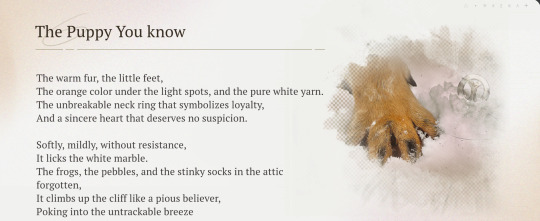
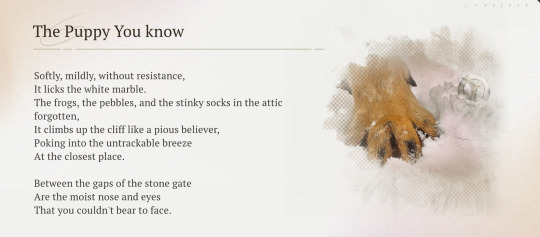
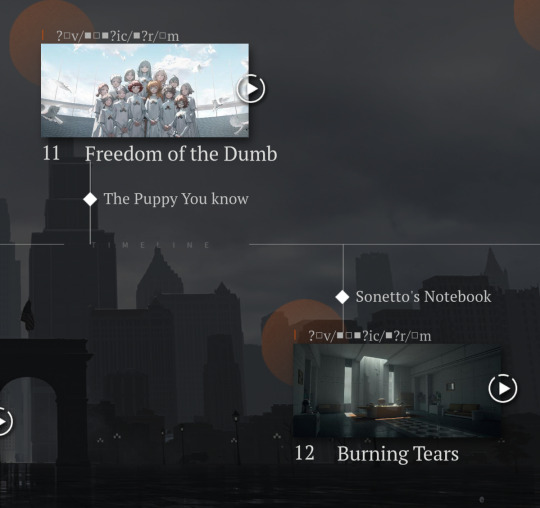
This poem is placed after Vertin is placed in a coma after the Tear Gas incident and before Sonetto gives Vertin her notebook.
I think the first paragraph is how Vertin perceives Sonetto. A loyal and sincere little puppy.
The second one sounds like the puppy choosing the Foundation. Licking white marble, climbing like a pious believer, and most importantly, forgetting the frogs, pebbles, and stinky socks in the attic. In other words, perhaps Vertin felt like Sonetto chose the Foundation over her and this fiasco was going to be the last straw. Sonetto has overcome all the hardships (climbing and pious) and has left Vertin behind to go to a place Vertin can't follow (untrackable breeze). Sonetto is at the "closest place" but she's further away than ever.
But the moist eyes and nose? Puppies have wet noses, but I think this is referring to Sonetto crying for Vertin. From our POV Vertin went down hard. I'm not sure if she managed to stay conscious long enough to see Sonetto cry. But in a more metaphorical sense the stone gate could be the separation between them. Vertin isn't looking for Sonetto, but Sonetto is looking for Vertin through the gaps while being "safe" on the other side.
But Vertin couldn't bare to face her.
Despite their differences, Vertin always speaks well of Sonetto in these snippets. Even in this one where she is "forgotten" she looks upon the puppy with fondness or admiration (thats how i interpret the verbiage used to describe Sonetto. She describes Schneider like this as well except as a frail dove instead of a determined puppy)
#reverse 1999#sonetto#vertin#i need someone who's better at this type of analysis to step in#way out of my depth here#but my mind goes back to this poem and it bugs me
64 notes
·
View notes
Text
“A pair of feet walk through a sea of glass.”
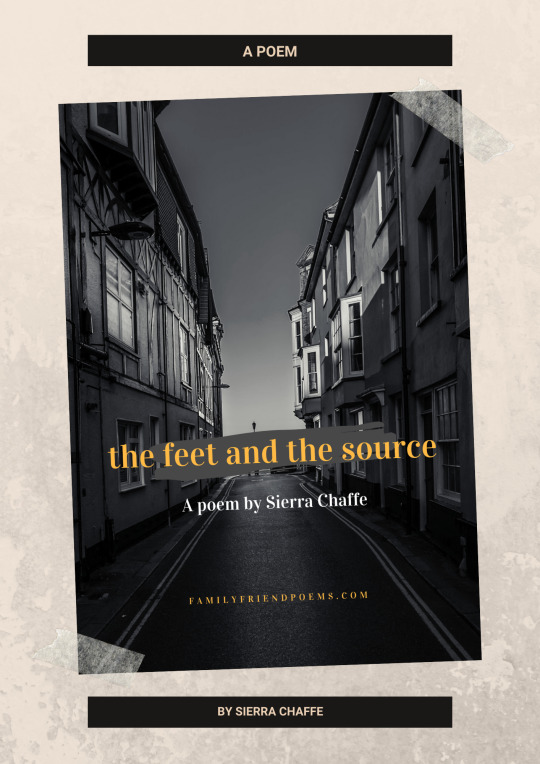
‘The Feet and The Source’, a poem written by Sierra Chaffe.
Read original post here.
Listen to my recital here.
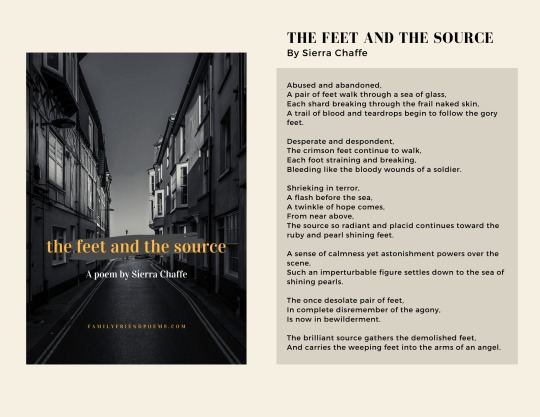
“The Feet And The Source” is a symbolism poem about an abandoned pair of feet that suffers alone, hurting and bleeding, without having anybody to give them aid. This poem shows how difficult it could be for children to be abandoned by everyone, their parents included, no matter the cause. Children and/or teenagers, in their growing age, have to be treated well and with affection for these factors can significantly affect their lives in the future. This poem tells the perspective of a child that felt as if they were abandoned by everyone through the symbolism of the feet that walk alone.
A variety of literary devices are used in this poem and one that stands out the most is symbolism. In the first stanza, we read about the abused and abandoned feet which represents a child that wanders alone in this world after getting abused and abandoned by, most likely, their own parents since if it were not because of their parents they would come home to them. Knowing they could not even come to their parents for help, the parents might be the problem. The sea of glass can also be taken as a symbolism which signifies all the things that hurt the pair of feet. So the line “A pair of feet walk through a sea of glass,” could mean a child that is suffering alone from all the pains that hurt them.
The second stanza contains a simile in the line “Bleeding like the bloody wounds of a soldier.” It is used to compare the pain that the feet have to endure to the bloody wounds of a soldier. The writer is implying that the pain from getting abandoned alone is equal to the pain of getting wounded as a soldier.
An imagery is then used in the third stanza. The writer tries to create a scene where the readers can use their senses to imagine. “Shrieking in terror, / A flash before the sea, / A twinkle of hope comes, / From near above, / The source so radiant and placid continues toward the ruby and pearl shining feet.” The descriptive words are used to appeal to readers' senses, with the hope of the readers to picture the scenery in their heads.
Another symbolism is used in the last stanza, where it says ‘And carries the weeping feet into the arms of an angel’. The arms of an angel symbolizes a good person that came as a helping hand to the abandoned child. An abused and abandoned child that has nobody else in the world surely would consider anyone who offers them help an angel because of their kindness. That is the message the writer is trying to deliver through the last line.
After all, the message is being delivered perfectly with the use of literary devices. Literary devices allow the writer to convey a deeper meaning that goes beyond what is written. This poem might look confusing at the first read but it has its own meaning, a tragedy that often occurs caused by many factors. It is important to not let a child and/or teenager get abandoned, for they still need parental love and support. Be kind and be there to help them so they would not feel as if they are going through the difficulties alone. The writer has done a great job bringing that message with this poem.
0 notes
Text

The Analysis of Yearning (Garod), Paruyr Sevak (from “Anthology of Armenian poetry")
#the analysis of yearning#karot#paruyr sevak#quotes#literature#poetry#poems#translated literature#classic literature#armenian poetry#armenian literature#longing#yearning
1K notes
·
View notes
Text
Screaming from the crypt (or how the past haunts the present on Midnights)
I know it's been discussed so much since Midnights came out but just.
I love how there is such a clear narrative throughout the album (and perhaps especially on the 3am/Vault tracks). About questioning and regret and choices and coming to terms with all of it. It is one long story about how we're all a mosaic of the choices we make, each one taking something from us and leaving something else in its place.
(And now a disclaimer: I'm looking at this mostly through a narrator/subject lens, and trying not to dive too deeply into real-life events or speculation except for in a general sense. For this purpose I like to look at the body of work as art, like literature, because I find it makes it easier to see the common threads in the different songs and cohesion in the narrative.)
In looking at the 3am+ tracks in particular, it's fascinating how some turns of phrases or themes repeat themselves in different songs, in different contexts. (I'm only focusing on the non-standard tracks because there are too many songs and I'd be here all day but I bet I could do a part two lol.) I know many people have pointed out the parallels throughout her discography already and I’m not saying anything groundbreaking by writing this, but I love how these parallels run through in the same album, because it makes it seem like it's one long story, or at least, one long rumination on many different stories that are coalescing into a single narrative.
Battle (let’s go)
For instance, the one that jumped out at me when I started writing this post the other week was, "Tore your banners down, took the battle underground," in The Great War and "If clarity's in death, then why won't this die? Years of tearing down our banners, you and I," in Would've, Could've Should've. It's a story about staying stuck in the same cycle of reliving trauma and coping mechanisms and bad habits over and over again and fantasizing about how taking the “antagonist” out and gaining the upper hand for good would bring closure (WCS), but the truth is that nothing ever will. All that cycle does, though, is repeat itself in other situations, and in this case pushes someone away the narrator cares for (TGW). The difference is that the imagined battle in WCS is a two-way street in her mind (that is ultimately unwinnable because it was never a fair fight), but in TGW it's one-sided -- she's the one fighting dirty, taking shots, the way she'd been doing in her imagination (or nightmares) all these years. But the person in front of her isn't fighting back the way the person in her mind in WCS would, because their intentions are honourable instead of exploitative.
And that's paralleled in another pair of lyrics from the two songs, "And maybe it's the past talking, screaming from the crypt, telling me to punish you for things you never did," (in TGW) and "The tomb won't close, I fight with you in my sleep," (in WCS). In both cases, the funeral imagery makes it seem like this past event should be dead and buried in WCS, but it keeps rising from the dead, haunting her no matter what she does and in TGW, another (or perhaps the same?) tomb that won't close keeps unleashing new ways to hurt her and in turn the new person in her life. In other words, the trauma from the past continues to bleed into the present.
(Again from a literary point of view, I'm not saying the events of the two songs are linked IRL, but they're fascinating textual parallels on the album as a string of chapters, which is why Dear Reader is so compelling, but that's a whole other essay.)
To keep the battle motif going, there’s yet another parallel, this time between TGW’s "[You were a] soldier down on that icy ground, looked up at me with honor and truth," and You’re Losing Me’s "All I did was bleed as I tried to be the bravest soldier, fighting in only your army.” In the former, the subject is laying down his armour in the war she’s projecting onto him, waving the white flag, and she realizes that she’s about to destroy something if she doesn’t put her sword down too. By the time we get to YLM, the roles are almost reversed; at the very least they’re supposed to be on the same team, but in this case she’s doing all the heavy lifting, fighting for their relationship in contrast to his apathy killing it. It’s also pretty interesting (if not outright intentional) that one of the 3am+ editions of the albums starts with The Great War, where they find themselves in conflict (even if it’s in her head) that ends in a truce, and ends with You’re Losing Me signalling the end of the relationship, evidence that the resolution in the first song wasn’t an ending but merely a ceasefire before the last battle.
Putting the rest under a cut because this is waaaaay too long now ⤵️
(There’s also another metaphor there in The Great War with its battle imagery: World War I, aka The Great War, was supposed to be the war to end all wars, because loss on its scale was never seen before and when it ended, most thought never again would the world embroil itself in such battle, the horrors and implications were so devastating. Two decades later, the world found itself in WWII, with an even larger scope and more horrific consequences, the intervening time between the two a period of festering conflicts and resentment leading to some of the worst acts the world would see. Bringing real life into it for a second, there’s something a little poetic, though sad, about The Great War the song being about a fight that could have ended the relationship that they ultimately resolved and was meant to be evidence of the strength of their love, but so too did it end up being a period of détente, the greater battle coming for them years later. But that is not the point of this post.)
If one thing had been different
Another major theme in these editions is pondering the "what ifs?" of life, but I think it takes on even more significance in the broader context of the album in the lyrics of "I'm never gonna meet what could've been, would've been, should've been you," in Bigger than the Whole Sky and the repetition of would've/could've in Would've, Could've, Should've (I would've looked away at the first glance, I would've stayed on my knees, I would've gone along with the righteous, I could've gone on as I was, would've could've should've if I'd only played it safe, etc.) In both songs, the narrator is mourning an alternate course their life could have taken* and questioning what they could have done differently, in the aftermath of trauma and loss, and the regret that comes with that loss, and with the loss of agency in the situation because ultimately it was never in their hands. In an album full of questions, wondering about the path not taken, or the forks in the road that have led to a different version of your life, it's digging deeper into the contrast of choice vs. fate, action vs. reaction, dwelling on the past vs. moving on. When you're supposed to let go of the past, what do you do when it is holding your future hostage?
(*I know there are different interpretations/speculation about BTTWS which I am not getting into on main. I'm just saying that whatever the song is about, it's grieving something that never came to be. The literal origin of the song is less important to the album than the sense of loss it portrays. Whatever the inspiration is, it's crafted to tell part of the story of Midnights of ruminating over how, to borrow from her previous work, if one thing had been different, would everything be different?)
(Also I was today years old when I realized that the words are inverted in the two songs. Apparently I've been hearing BTTWS wrong this whole time.)
There's also an interesting tangent in the role of faith in both songs: in WCS, the events of the story cause her to lose her faith (e.g. "All I used to do was pray," "you're a crisis of my faith,") and question all the things she felt had been unquestionable until that point in her life (e.g. "I could have gone along with the righteous"), whereas in BTTWS, she questions whether that very lack of faith is to blame for the loss in that song ("did some force take you because I didn't pray? [...] It's not meant to be, so I'll say words I don't believe"). It's like pinpointing the moment her life changed and upended her beliefs (WCS), but as a result then leaving her unmoored in times of crisis because ultimately there's no explanation or comfort to be taken from what she used to hold true before that (BTTWS). The words she once relied upon to guide her have long since lost their meaning, but in times of trouble it leaves her wondering if that faith she once held then lost could have prevented this pain.
(Shoutout to WCS for being Catholic guilt personified lol.)
To keep on with the vaguely faith-y notions, an obvious parallel is the line in Would’ve Could’ve Should’ve about, “I damn sure never would've danced with the devil at nineteen,” and, "When you aim at the devil, make sure you don't miss," in Dear Reader. All of WCS is about her fighting with an antagonist who haunts her, with whom she wholly regrets ever becoming involved. DR could be seen as a reflection on that fall from grace, warning the audience that if you choose to go after the person (or thing) haunting you, make sure you do so clearheaded enough to be decisive. Again, these “devils” may not be related in real life: the IRL devil in DR could be speaking about her naysayers, or Kim*ye, or Scott & Scooter B, etc., meaning not to cross your enemies until you know you can win. But taking real life out of it and looking at it textually, I am intrigued by the link between WCS and DR, so that’s what I’m going with here. And perhaps that’s even the point in a wider sense; there will be multiple “devils” in your life, or threats to your well-being. If you’re going to commit to taking them down — whether it’s an actual person, or the demons inside you that refuse to let you go — make sure you have the right ammo so that they can no longer hurt you. (Of course, one lesson from these experiences is that sometimes you can’t win, and you have to live with the fallout.)
(Sidebar: I know that “dancing with the devil” is a turn of phrase that means being led into temptation and engaging in risky behaviour, as opposed to describing the actual person. Given the religious metaphors in the song, that could very well be/is the intention, particularly when it’s preceded by, “I would have stayed on my knees” as in she would have continued to follow her faith — in whatever sense that means — had she never met this person, which could also be a more eloquent way of saying she would have continued to be live her life in a way that was righteous (even naive) and seen the world in black and white. Either way, it’s a force she wholly rejects. Like I said, multiple devils, same fight.)
Regret comes up too: in WCS, she says, "I regret you all the time," obviously directed at the person who manipulated her and led to her perceived downfall, citing him as the one impulse she wished she'd never followed, because it won't leave her no matter how hard she’s tried. In High Infidelity, she tells the person to, "put on your records and regret me," and on the surface, it’s like she’s turning the tables, painting herself as the one now causing the regret in someone else, the one inflicting the pain this time. Yet the verse preceding it and the lines following it in the chorus depict a partner who is also emotionally manipulative and vindictive like in WCS (“you said I was freeloading, I didn’t know you were keeping count,” “put on your headphones and burn my city,”). It’s not so much that she’s intentionally harming the person (the way the person in WCS does to her), but rather that the venom in the subject’s feelings towards her seeps through; she’s imagining the way he’s going to feel about her when she leaves, hating her just for by being who she is. (There could be another tangent about how in both songs she’s there to be a “token” in a game for both of the men, who play her for their own purposes.) The regret is dripping with disdain. It’s as though she’s picturing how the person is going to hate her for doing what she’s thinking of doing the way she hates the person who first hurt her.
Sadness, unsurprisingly, shows up in a few lyrics. In BTTWS, “Everything I touch becomes sick with sadness,” sets the scene of a person so overcome with grief that it permeates everything around them; they cannot see their way out of it and feel like the fog will never lift. In Hits Different, it’s, “My sadness is contagious,” the result of a breakup where the person’s grief again touches everything and everyone around them, pushing them further in their despair and loneliness. The reason behind the grief in either case may vary, but regardless of the source, the feeling is overpowering and isolating. They may be different chapters in the story, but the devastation is hauntingly familiar. (As is a recurring theme in Midnights as a whole: there are situations and feelings that present themselves at different points in her journey and colour in the lines in different ways along the road. Like revisiting an old vice and realizing the hit isn’t quite the same as it was in the past.)
Death by a thousand cuts
She also writes about wounds on this album, which isn't surprising I suppose given that the whole conceit is that these are things that have kept her up at night over the years. WCS is perhaps the driving narrative on this never ending hurt when she sings, “The wound won't close, I keep on waiting for a sign, I regret you all the time,” suggesting that no matter what she does, the pain of this experience has permeated everything she’s done afterwards. (Not unlike the overwhelming grief in BTTWS, for instance.) Elsewhere, in High Infidelity she sings, "Lock broken, slur spoken, wound open, game token," and in Hits Different, "Make it make some sense why the wound is still bleeding.” Again I'm not suggesting they're about the same events; the line in HI is about a situation where a partner crosses a boundary, hits below the belt, picks at an insecurity (or creates a new one) and treats the relationship like it's transactional, opening the floodgates in turn. In HD, the wound seems to be more self-inflicted, where she's pushed the person away. (Over a situation real or imagined she feels she needs distance from.) But again, something has picked at her like a raw nerve, and just like in the past, she's hurting, even in a different time and place and person. Almost like the wounds of the past break open over and over again to create new scars. If one were to extrapolate further, it wouldn’t be the biggest leap to wonder if the wound open in WCS, then torn apart in HI makes the one in HD hurt even more.
(I once wrote a post about how I think as time goes on, WCS is going to turn into one of those songs that will be found to drive so much of her work, because it’s just… kind of the unsaid thesis statement of so much of her songwriting.)
Another repeated theme is that of the empty home and loneliness. In High Infidelity, she sings, "At the house lonely, good money I'd pay if you just know me, seemed like the right thing at the time," painting a picture of someone who may have everything they'd want to the outside world, but in reality feels metaphorically trapped in their home (or at least alone amidst abundance), a symbol of a relationship gone sour and a failure to build connection. She just wants someone to understand her, want her for her, but as she's written earlier in the song, she's just a pawn in the game, a trophy from the hunt. Home, in this case, is lonely, isolated, an emblem of her fears. In Dear Reader, she continues this thread, then singing, "You wouldn't take my word for it if you knew who was talking, if you knew where I was walking, to a house not a home, all alone 'cause nobody's there, where I pace in my pen and my friends found friends who care, no one sees you lose when you're playing solitaire." It's the same idea, admitting to listeners that the gilded cage she lived in kept her distanced from her loved ones and real connection, keeping her struggles close to the vest but feeling desperately lonely amidst her crowning success. She's pushed people away and it may have felt like the right thing at the time, but in the end maybe felt like she was trapped. And when you push people away, eventually they take you at your word and stop pushing back; you’re a victim of your own success at isolating yourself. What starts out of self-preservation then further perpetuates the underlying problems.
(There's another interesting link about "home" also feeling unsafe with HI's "Your picket fence is sharp as knives," which further leads into the theme of marriage/domesticity feeling dangerous, which is a whole other thing I won't get into here because it's another discussion and may derail this already gargantuan word salad.)
In a slightly similar vein, we have the metaphor of bad weather for a rocky road or unstable relationship, in High Infidelity again with, "Storm coming, good husband, bad omen, dragged my feet right down the aisle" and You’re Losing Me’s "every morning I glared at you with storms in my eyes.” They aren’t speaking of the same situation or even same kind of breakdown, but it is pretty interesting how the idea of clouds/storms/floods/etc. play such a role in Taylor’s music to signal depression, apprehension, fear, uncertainty, etc. In HI, I think the “storm” coming is the looming threat of commitment to a partner who makes the narrator uneasy (if not fearful). In this case, the idea of making a life with this person is not one that incites joy or comfort, but instead makes the narrator feel that dark times are ahead if she continues down this path. Perhaps in some way, the “storms” in YLM have made good on the threat in HI in a different way; it’s a different home, a different relationship, but the clouds have settled in regardless, and some of her fears have come to fruition in ways she did not expect. The person she once trusted no longer sees her or her struggles (or worse, doesn’t care), and the resentment and pain build with each passing day.
Coming back to heartbreak, one of the obvious "full circle" moments is the beginning of a relationship in Paris, where she says that, "I'm so in love that I might stop breathing," clearly enthralled in a new love that allows her to shut the world out and grow in private, capturing the all-encompassing nature of the relationship. This infatuation has consumed her in the most wonderful way (in contrast to the sorrow of some of the previous songs), and it feels like a life-altering (or even life-sustaining?) force that is so strong she may forget what it’s like to breathe. (Metaphorically speaking, of course.) By the end of the album, though, in You're Losing Me, that heart-stopping love has become a threat: "my heart won't start anymore for you." In the former, her racing heart is full of excitement, but by the latter, her heart has given out completely under the weight of the pain she bears. (YLM is full of death/illness imagery which I already wrote about awhile ago so I won't hear, but needless to say that song deserves its own essay for so many reasons.) She's gone from the unbridled joy of the beginnings of a relationship to the unrelenting sorrow of its end, two sides of the same coin.
Love as death appears elsewhere in the music too, for instance, in High Infidelity’s, “You know there's many different ways that you can kill the one you love, the slowest way is never loving them enough" and You’re Losing Me’s “How can you say that you love someone you can't tell is dying? […] My face was gray, but you wouldn't admit that we were sick.” Though not completely analogous situations, they both tell the tale of one partner’s apathy (or at least denial) destroying the other. In the former, the partner’s actions (or inaction) are more insidious, if not sinister; in the latter, the lack of momentum (or admission of a problem) is passive. In both cases, the end result is the narrator’s demise; it’s a drawn out affair that chips away at her morale and her health and her sense of self. (Breaking my own rule about bringing in alleged actual events into the discussion, but the idea that the relationship in High Infidelity, which was obviously fraught with unease and even fear, ended in a similarly excruciatingly slow and hurtful death by a thousand cuts as the relationship in You’re Losing Me almost did at that time must have been so painful. It almost feels like YLM is wondering why what used to be a source of light in her life was mirroring a situation that caused her such pain in the past.)
From the same little breaks in your soul
I said early on that part of what is so compelling about Midnights is that it feels like an album about ruminating — on choices, on events, on people — and the two final “bonus” tracks of the album depict that as well. In Hits Different, she sings that, “they say if it’s right, you know,” an ode to the confusion of a breakup and struggling with the aftermath of calling it quits. It’s a line that has always intrigued me, because the typical use of the phrase is in the sense of, “you’ll know when you meet the one,” but here it seems to have a double meaning, a reassurance perhaps from the friends (who later on tell her that "love is a lie") that she’ll know if she’s made the right decision in calling it off, but could also be her wondering if the relationship is right, she’ll know, and want to reconcile. In the final bonus track, You’re Losing Me, she sings, “now I just sit in the dark and wonder if it’s time,” this time leaving no doubt about the dilemma she faces, though it’s no less fraught. She’s wondering, perhaps for the last time, if now is finally the moment to end the relationship for good. They say that if it’s right she’ll know, and now she’s wondering if that feeling inside her (that once told her her partner was the one, which is why it hit differently), is telling her that it’s time to go for good. Wait Alexa play “It’s Time To Go.” These are not only the things that keep her up at night, but the things that play over in her mind like a film reel in her waking hours.
Midnights as a whole is a deeply personal album, as is most of Taylor's work, but the 3am+ edition tracks seem to dig even deeper to a lot of the issues raised on the standard album. Almost like the standard tracks are the things she wonders about on sleepless nights, but the bonus tracks are the things that haunt her in the aftermath. The regret, anger, sadness, grief, relief, even joy— they’re the price she pays for the memories she keeps reliving. Midnights might be the most cohesive narrative of all her albums, and really does feel like we’re watching someone work through her journal over time, stopping short of outright naming those giant fears and intrusive thoughts (except for when she does) but making them plain as day when you connect the songs together, and perhaps never more clearly than in the expanded album. It’s incredible how the songs stand on their own to relay a specific moment in time, but that they are also self-referential to each other (whether thematically or overtly) to weave a larger web over the entire work. We’re so lucky as fans to have these stories and to keep peeling back these layers as time passes. (And my literature-analysis-loving ass loves her even more for it.)
This is obviously by no means an exhaustive list, and I know there are more parallels and probably even stronger links (particularly when you add the standard version into the mix), but these were the ones that particularly struck me and I’m just glad I’ve had a chance to sit with this and think it through. ❤️
#writing letters addressed to the fire#me thinking too hard about taylor lyrics#taylor swift#midnights#long post#lyrics analysis#song parallels#Gabby this one is for you friend <3#here goes nothing#Happy Friday or something idk!#(also i know i said there are things i wouldn’t discuss on main but my dms are open lol)#this is not as structured or well plotted out as I wanted it to be#and turned out to be more stream of consciousness than legit essay#but whatever at least i got my thoughts out there and it can release some plot of land in my brain for other stuff to think over lol#If anyone ever reads this thank you! And I’m sorry?#The best compliment i ever got in school#was when we were doing an analysis of a poem in English lit in college#And i brought something up casually#and my prof went ‘I’ve been teaching this class for eight years and that’s the first time anyone’s ever brought it up like that’#’and that just blew my mind’#and i was like ‘who me?’#so that’s all you need to know about me lol#Midnights: The Great War#Bigger than the whole sky#bttws#Midnights: Paris#Midnights: high infidelity#would’ve could’ve should’ve#Midnights: dear reader#midnights: bigger than the whole sky
83 notes
·
View notes
Text
Think about Dick Grayson, such a loyal and loving person, having to leave Bruce and Gotham so many times over the years. Whether Bruce pushed him away once more, or maybe he just felt so sick he just had to leave. Sometimes nobody's at fault, it just happens. People drift away, and maybe Gotham was never truly his hometown anyway.
They'll never be 9 and 25 again, each other's whole world.
They say you never love anything the way you love your first child. Bruce will forever miss the little boy he took in, with great fear and greater love. He misses the little ball of sunshine that was shaking his chandeliers and rocking his world.
They say the firstborn ages with their parent, that the two are maturing together. Dick will forever miss the man who wrapped his jacket around him and told him it'll be okay when he was sobbing on the circus floor. He misses Bruce's soft smile, the one he had when there were fewer wrinkles, white hairs, and all sorts of aches.
The persistent heartache that it is to love and to be loved by Bruce Wayne. The pain of having to be the one who leaves first.
Tiktok slideshows are going to be the end of me.
#i blame tiktok#tiktok slideshow#dick grayson#nightwing#robin#bruce wayne has issues#bruce wayne#batman#dc comics#batfam#dick grayson has eldest daughter syndrom#poems and quotes#dc#character analysis#dick grayson and bruce wayne#mother daughter coded#father and son#complicated relationships
98 notes
·
View notes